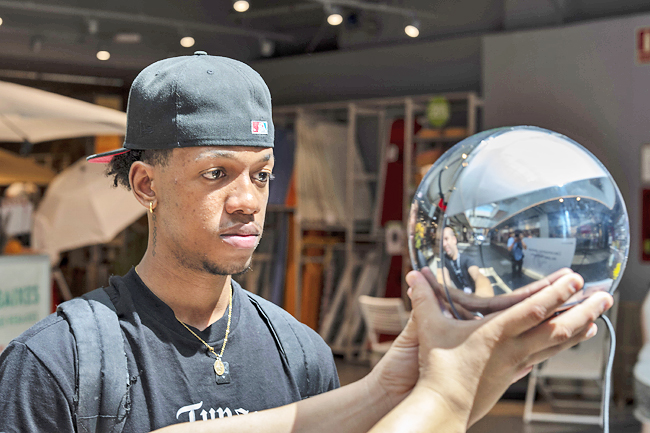NEW YORK (AP) – Weeks after its international launch, Worldcoin is drawing the attention of privacy regulators around the world, with Kenya’s government going so far as to shut down the service indefinitely.
The international ID startup, backed by big names in Silicon Valley, is now having to defend itself in investigations over whether the biometric data that the company is collecting is truly secure.
Here’s what to know about Worldcoin and the concerns its raising:
WHAT IS WORLDCOIN?
Worldcoin is the creation of Sam Altman, best known as the Chief Executive Officer (CEO) of OpenAI, the company that has gained widespread recognition with its artificial intelligence chatbot ChatGPT.
The goal of Worldcoin and the company backing it, Tools for Humanity, is to give people a form of identification that could never be stolen or duplicated.
Worldcoin creates a ‘World ID’ by scanning someone’s eyeballs through orbs – a device that captures an image of their irises, the coloured parts of the eyes. One possible use for such an ID would be online services, where oftentimes people are having to remember multiple passwords and usernames for various websites they have signed up for.

The security of those sites can be flawed, however, and there have been numerous security breaches where usernames and passwords have been stolen. Instead of using old technology like passwords, a person could just sign up using their World ID.
WHAT IS ITS CONNECTION TO CRYPTO?
Worldcoin is first and foremost an identification project but is using cryptocurrency to get people to sign up. The Worldcoin token is trading for roughly USD1.90, but its value is largely based on speculation rather than its current usability as a currency.
Worldcoin launched officially in July, and as part of the promotion, early adopters were given an amount of cryptocurrency worth between USD50 and USD60, depending on the jurisdiction. Most of the countries where Worldcoin launched don’t widely use or accept crypto. Further, USD50 is a lot of money in developing countries where people are being asked to sign up, including Kenya, where the average monthly income is roughly USD170.
WHY IS WORLDCOIN GAINING ATTENTION?
Thousands of Kenyans lined up in Nairobi last week at a registration centre where Worldcoin scanned their irises in exchange for 25 coins worth about USD50.
The largely youthful crowd included a special line for mothers who waited with children strapped to their backs.
Some of those in line told local media that they had travelled for miles after friends said free money was being handed out.
They acknowledged not knowing why they needed to scan their irises and where that information would go but just wanted the money.
University graduates were among those who waited for hours, alluding to the high rate of unemployment in Kenya, where many are angry over the rising cost of living.
The Kenyan government has since suspended new sign-ups for Worldcoin as it investigates whether people’s information is being properly protected.
Interior Minister Kithure Kindiki said last week that investigations of the safety and protection of the data being harvested and how the harvesters intend to use the data had started.
WHAT ARE THE PRIVACY CONCERNS?
Worldcoin’s orbs collect biometric data by taking photographs of a person’s iris. While Worldcoin argues that the data is used to create a unique, secure form of identification, privacy experts have concerns that the company may use the information in other ways, like personalised marketing.
That has led some countries to investigate Worldcoin’s operations, including France, Germany and now Kenya.
The Bavarian State Office for Data Protection Supervision says it has initiated a comprehensive investigation of Worldcoin and Tools for Humanity over data security practices.






